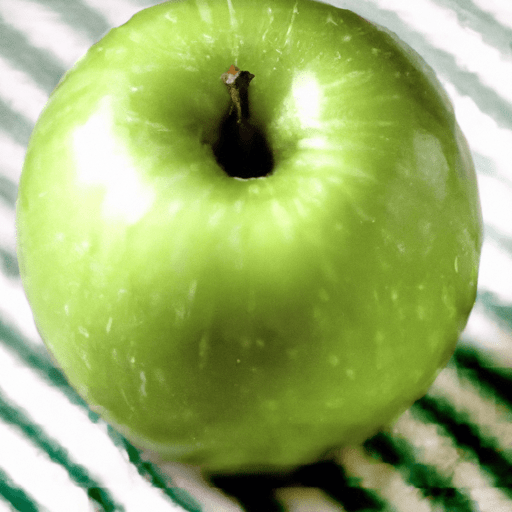The Delightful Green Apple: A Versatile Ingredient in the Kitchen
Have you ever experienced the crisp and refreshing taste of a green apple? If not, you’re in for a treat. Known for their vibrant color and distinct tartness, green apples are not only visually appealing, but they also add a delightful zing to a plethora of dishes. In this blog post, we will explore the taste, culinary applications, nutritional benefits, and intriguing history of this remarkable fruit.
The Taste of Green Apples: A Perfect Balance
One bite into a green apple instantly reveals its characteristic tanginess. The mouth-puckering acidity is perfectly balanced with a subtle sweetness, making it an excellent choice for those who prefer a slightly sharper flavor in their culinary creations. The crisp texture and juicy flesh of the green apple add an enjoyable crunch, enhancing any dish it accompanies.
From Salads to Sauces: Versatile Cooking Uses
Green apples are incredibly versatile in the kitchen, lending their distinct flavor to a myriad of recipes. Whether they are the star ingredient or a supporting element, green apples have found their way into both sweet and savory dishes.
Sweet Treats with a Tangy Twist
When it comes to desserts, green apples can be used in various ways. They make a marvelous addition to pies and tarts, creating a balance between tartness and sweetness that is hard to resist. Baking the apples releases their natural juices, resulting in a luscious filling with a hint of acidity.
Green apples also shine in compotes and chutneys. Their tartness elevates these sauces to new heights, complementing everything from baked goods to creamy desserts like panna cotta or cheesecake.
Savory Innovations with Green Apples
In savory dishes, green apples add a refreshing twist that cuts through rich and heavy flavors. They can be transformed into creamy soups, such as butternut squash and green apple soup, where their tartness creates a harmonious balance with the earthy sweetness of the squash.
Salads become more exciting with the addition of thinly sliced or diced green apples. Their crisp texture and tangy flavor provide a delightful contrast to leafy greens, roasted vegetables, or even a cheese and nut platter.
Nutritional Benefits of Green Apples
Beyond their culinary versatility, green apples offer a range of nutritional benefits. Packed with dietary fiber, these apples promote healthy digestion and contribute to a feeling of fullness. Additionally, they are a rich source of vitamin C, supporting a strong immune system.
The skin of a green apple contains antioxidants that help protect cells from damage caused by free radicals. So, remember to enjoy the apple whole, as the skin holds these valuable nutrients!
A Historical Twist
Green apples have a rich history that dates back centuries. Originating from Central Asia, where they were cultivated in the mountains of Kazakhstan, apples quickly spread across Europe and eventually reached North America with the arrival of the colonists.
Interestingly, green apples were often used in traditional folk remedies due to their perceived health benefits. They were considered valuable in treating digestive ailments and were even believed to ward off evil spirits.
Conclusion
Green apples are a true culinary gem, delivering a burst of tanginess, versatility, and a range of nutritional benefits. From adding depth and complexity to desserts to brightening savory dishes, these vibrant fruits are worth incorporating into your cooking repertoire. So, whether you’re looking to explore new flavor combinations or enhance traditional recipes, don’t shy away from the delightful green apple - it might just become your secret ingredient for adding a refreshing twist to your culinary creations!
Green Apples
- Green apples are a variety of apple characterized by their bright green skin.
- Originating from Central Asia, apples have been cultivated for thousands of years and have become one of the most widely consumed fruits globally.
- The skin of green apples is high in antioxidants, which can help protect the body against damage from free radicals.
- Green apples are a good source of dietary fiber, aiding digestion and promoting a feeling of fullness.
- These apples also contain a variety of vitamins and minerals, including Vitamin C, potassium, and vitamin K.
- Green apples are commonly used for fresh eating, as well as in various culinary applications such as salads, desserts, and juices.
- The tart and crisp flavor of green apples makes them popular for baking and cooking, as they add a refreshing and tangy taste to dishes.
- Due to their lower sugar content compared to some other apple varieties, green apples are often preferred by individuals seeking to manage their blood sugar levels or follow a low-sugar diet.
- Green apples have a longer shelf life compared to some other apple varieties, making them suitable for storage and transportation.
- In folklore and mythology, apples are often associated with love, beauty, and wisdom. They are also symbolically linked to abundance and fertility in various cultures.




Use the share button below if you liked it.
It makes me smile, when I see it.